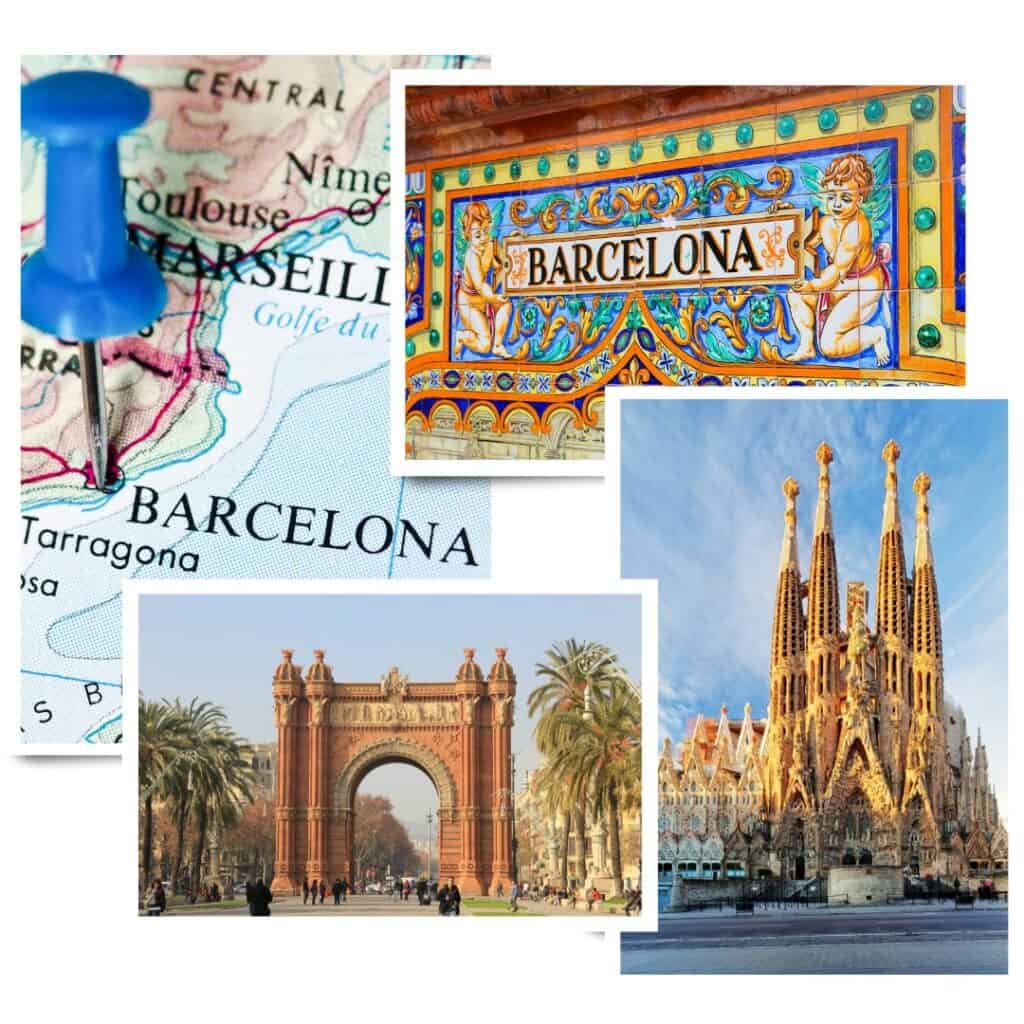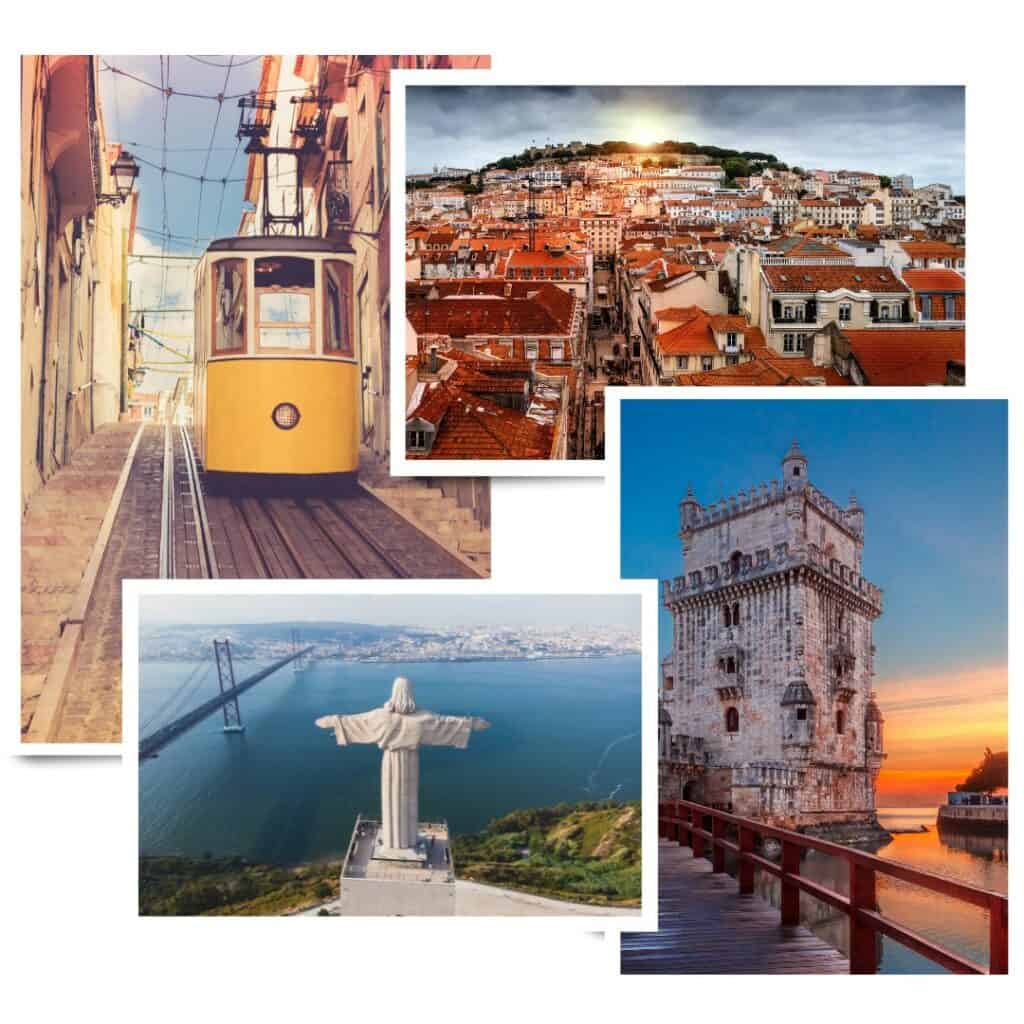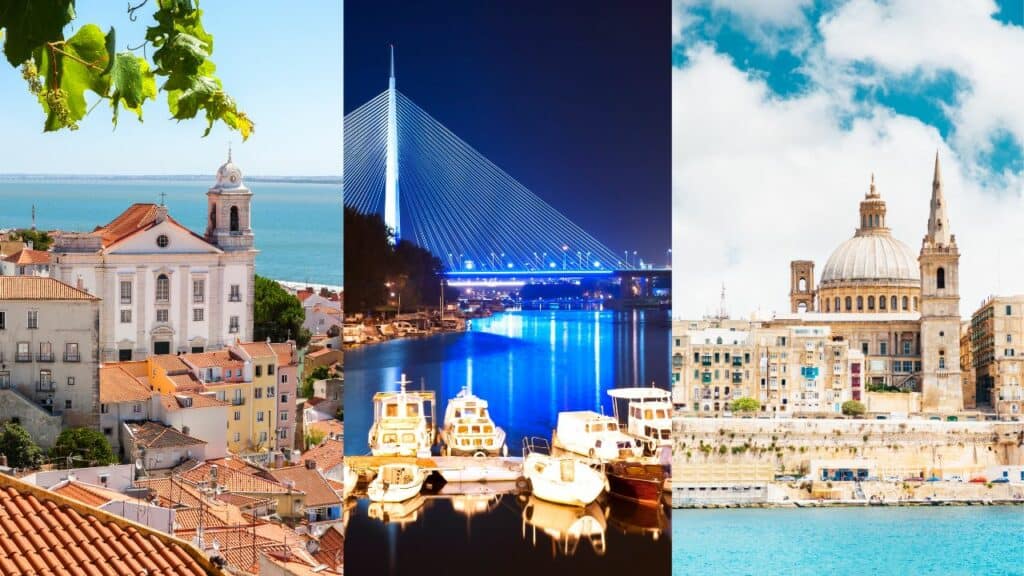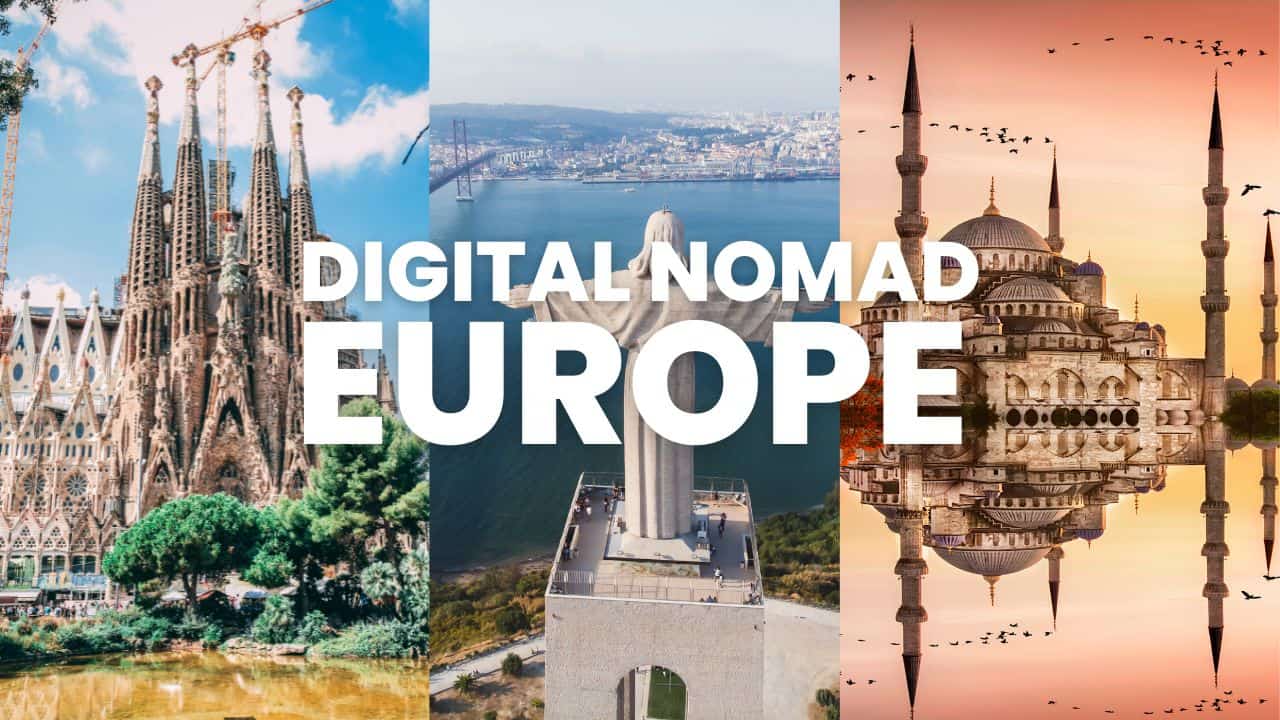17 Best Digital Nomad Cities in Europe (2023)
From Barcelona to Belgrade, Europe’s cities have always been a magnet for travelers seeking culture, history, and adventure. In the age of remote work, digital nomads are flocking to the continent in search of the perfect balance of work and play.
In Budapest, you can work all day, party all night, and work off the hangovers in the famous thermal baths; in Istanbul, you can dig out ancient history after finishing the day’s meetings, and in Tirana, you can live like royalty in one of the most budget-friendly capitals in the world.
If you’re planning a life as a digital nomad, then keep reading, as we countdown our list of the top 17 Digital Nomad cities in Europe for remote work in 2023.

Table of Contents
Best Digital Nomad Cities in Europe
We’ve ranked the best cities in Europe for digital nomads based on a variety of important factors, including history, culture, location, climate, and affordability.
Of course, everyone has their own style, their own bucket list to complete, and their own preferences when it comes to traveling, so we’ve tried to cover both the popular destinations and cities we know are up-and-coming.
Our favorite digital nomad cities in Europe include Barcelona, Budapest, Berlin, Lisbon, Krakow, Vilnius, Tirana, Madeira, Belgrade, Sofia, and many more. Here’s our list in full!
1. Barcelona, Spain

Beautiful Barcelona – the city of Gaudí, tapas, and a fiesta-style nightlife.
Digital nomads are drawn to this Mediterranean classic for its creative vibe, walkability, and mild climate.
The city is filled with coworking spaces, cafes, and picturesque neighborhoods that make working from your laptop a pleasure.
Barcelona has an average wifi speed of 21 Mbps, an average cost of living for short stays of $5,100 per month, and the average rent cost for a 1-bed studio is $1,350.
| Pros | Cons |
|---|---|
| Vibrant culture | Higher cost of living |
| Great food scene | Tourist crowds |
| Good public transportation | Spanish bureaucracy for paperwork |
2. Budapest, Hungary

Budapest, the “Paris of the East,” offers a unique melange of history and modernity.
The city has become a digital nomad hotspot thanks to its affordable cost of living, thermal baths, and fast internet.
The Danube River and its stunning bridges make for a picturesque backdrop for work and leisure.
Budapest has an average wifi speed of 30 Mbps, an average cost of living for short stays of $2,400 per month, and the average rent cost for a 1-bed studio is $650.
| Pros | Cons |
|---|---|
| Affordable cost of living | Language barrier |
| Rich history and architecture | Cold winters |
| Fast internet speeds | Limited job opportunities |
Our Budapest Digital Nomad Guide
3. Berlin, Germany

Berlin is known for its eclectic mix of art, history, and edgy hipster culture.
This city is a haven for freelancers and startups, making it an ideal destination for digital nomads.
Berlin also boasts an efficient public transportation system, a diverse food scene, and world-famous nightlife.
Berlin has an average wifi speed of 50 Mbps, an average cost of living for short stays of $4,000 per month, and the average rent cost for a 1-bed studio is $1,450.
| Pros | Cons |
|---|---|
| Tech-friendly environment | High competition for housing |
| Diverse culture | Complicated bureaucracy |
| Excellent public transport | Cold winters |
4. Lisbon, Portugal

This coastal city is a digital nomad’s paradise, with its warm weather, laid-back lifestyle, and photogenic streets.
Lisbon is a city that embraces remote work, offering a plethora of coworking spaces and cafes.
The city’s rich history, unique architecture, and proximity to beautiful beaches make it a top choice for remote workers.
Lisbon has an average wifi speed of 39 Mbps, an average cost of living for short stays of $3,700 per month, and the average rent cost for a 1-bed studio is $1,700.
| Pros | Cons |
|---|---|
| Warm climate | Hilly terrain |
| Affordable cost of living | Limited public transportation |
| Friendly, English-speaking locals | Tourist crowds |
Our Portugal Digital Nomad Guide
5. Krakow, Poland

Krakow, the former royal capital of Poland, is a charming city that offers a unique blend of history and modernity.
It’s a popular choice for digital nomads due to its affordable cost of living, rich culture, and fast internet speeds.
The city’s old town, a UNESCO World Heritage site, is perfect for finding inspiration.
Krakow has an average wifi speed of 19 Mbps, an average cost of living for short stays of $2,700 per month, and the average rent cost for a 1-bed studio is $900.
| Pros | Cons |
|---|---|
| Affordable cost of living | Cold winters |
| Rich cultural scene | Language barrier |
| Fast internet speeds | Limited job opportunities |
6. Istanbul, Turkey

Istanbul, the city that straddles two continents, offers a historic blend of cultures, history, and modernity.
Digital nomads are drawn to Istanbul for its low cost of living, fast internet, and vibrant food scene.
The city’s historic sites, bustling markets, and friendly locals make it an ideal destination for remote work.
Istanbul has an average wifi speed of 6 Mbps, an average cost of living for short stays of $2,200 per month, and the average rent cost for a 1-bed studio is $1,400.
| Pros | Cons |
|---|---|
| Low cost of living | Political instability |
| Rich history and culture | Heavy traffic |
| Fast internet | Language barrier |
7. Valletta, Malta

Valletta, the stone-walled capital of Malta, offers a Mediterranean lifestyle with a rich history.
The city is popular among digital nomads for its warm climate, English-speaking locals, and stunning architecture.
Valletta’s compact size makes it easily walkable, while its location offers easy access to nearby beaches and islands.
Valletta has an average wifi speed of 27 Mbps, an average cost of living for short stays of $5,000 per month, and the average rent cost for a 1-bed studio is $2,200.
| Pros | Cons |
|---|---|
| Warm climate | Limited coworking spaces |
| English-speaking locals | Higher cost of living |
| Historic architecture | Small size, fewer opportunities |
8. Athens, Greece

The ancient city of Athens offers digital nomads everything from history and culture, to endless Gyros!
The city boasts affordable living, fast internet, and a thriving startup scene.
Its proximity to the beautiful islands of the Aegean Sea makes it an attractive destination for remote workers.
Athens has an average wifi speed of 9 Mbps, an average cost of living for short stays of $3,700 per month, and the average rent cost for a 1-bed studio is $1,050.
| Pros | Cons |
|---|---|
| Affordable cost of living | Economic instability |
| Rich history and culture | Heavy traffic |
| Proximity to beautiful islands | Language barrier |
9. Bratislava, Slovakia

Bratislava, the capital of Slovakia, is an emerging digital nomad destination, offering a low cost of living, fast internet, and a rich cultural scene.
The city’s compact size andcobbled old town make it an ideal place for remote workers who want to experience Central European culture without the hustle and bustle of larger cities.
Bratislava has an average wifi speed of 19 Mbps, an average cost of living for short stays of $2,400 per month, and the average rent cost for a 1-bed studio is $700.
| Pros | Cons |
|---|---|
| Low cost of living | Limited job opportunities |
| Charming old town | Language barrier |
| Fast internet | Smaller expat community |
10. Vilnius, Lithuania

Vilnius, the capital of Lithuania, has a rich history, a vibrant cultural scene, and its own independent republic (Uzupis!).
The city offers digital nomads affordable living, fast internet, and a thriving startup ecosystem.
Its baroque architecture, winding streets, and lush parks make it an inspiring location for remote work.
Vilnius has an average wifi speed of 14 Mbps, an average cost of living for short stays of $3,800 per month, and the average rent cost for a 1-bed studio is $1,000.
| Pros | Cons |
|---|---|
| Affordable cost of living | Cold winters |
| Rich cultural scene | Limited public transportation |
| Thriving startup ecosystem | Language barrier |
11. Prague, Czech Republic

The enchanting city of Prague offers a fairy tale setting for digital nomads, with its gothic architecture and cobblestone streets.
The city boasts a low cost of living, fast internet, and a thriving expat community.
Prague’s arts scene, historic sites, and beautiful parks make it an ideal destination for remote work. And there’s more beer here than you could ever hope to drink in a lifetime!
Prague has an average wifi speed of 20 Mbps, an average cost of living for short stays of $4,300 per month, and the average rent cost for a 1-bed studio is $1,050.
| Pros | Cons |
|---|---|
| Low cost of living | Tourist crowds |
| Rich cultural scene | Limited job opportunities |
| Fast internet | Language barrier |
Our Prague Digital Nomad Guide
12. Tirana, Albania

Tirana, the capital of Albania, is a wild-car contender offering digital nomads a unique and off-the-beaten-path experience.
The city has a low cost of living, fast internet, and a curious graffiti-led art scene.
The street art, friendly locals, and proximity to stunning natural attractions make Tirana an attractive destination for remote workers.
Tirana has an average wifi speed of 5 Mbps, an average cost of living for short stays of $1,900 per month, and the average rent cost for a 1-bed studio is $800.
| Pros | Cons |
|---|---|
| Low cost of living | Limited coworking spaces |
| Friendly locals | Language barrier |
| Proximity to natural attractions | Limited public transportation |
13. Madeira, Portugal

Madeira, a rugged Portuguese island in the Atlantic Ocean, offers digital nomads a unique island lifestyle with a warm climate and breathtaking landscapes.
The island has become a remote work hub, with its fast internet, affordable cost of living, and supportive ex-pat community.
Madeira’s stunning natural beauty makes it a perfect destination for work-life balance.
Madeira has an average wifi speed of 38 Mbps, an average cost of living for short stays of $2,600 per month, and the average rent cost for a 1-bed studio is $700.
| Pros | Cons |
|---|---|
| Warm climate | Remote location |
| Affordable cost of living | Limited nightlife |
| Beautiful landscapes | Limited job opportunities |
14. Belgrade, Serbia

Belgrade, the capital of Serbia, is an emerging digital nomad destination that’s shaking off its conflicted recent past.
The city offers a low cost of living, fast internet, and cheap rakia!
Its historic sites, lively cafes, and friendly locals make Belgrade an attractive option for remote workers.
Belgrade has an average wifi speed of 24 Mbps, an average cost of living for short stays of $2,300 per month, and the average rent cost for a 1-bed studio is $800.
| Pros | Cons |
|---|---|
| Low cost of living | Limited public transportation |
| Rich cultural scene | Language barrier |
| Fast internet | Cold winters |
15. Warsaw, Poland

Warsaw, the capital of Poland, is that Phoenix that rose from the ashes.
The city has a low cost of living, fast internet, and numerous coworking spaces.
Warsaw’s historic sites, modern architecture, and green spaces make it a great destination for remote work.
Warsaw has an average wifi speed of 16 Mbps, an average cost of living for short stays of $2,700 per month, and the average rent cost for a 1-bed studio is $700.
| Pros | Cons |
|---|---|
| Low cost of living | Cold winters |
| Thriving tech scene | Language barrier |
| Fast internet | Limited job opportunities |
16. Brasov, Romania

Brasov, in the heart of Romania’s Carpathian Mountains, has history, nature, and affordability.
The city has a low cost of living, fast internet, and beautiful medieval architecture.
Its proximity to stunning hiking trails and ski resorts makes Brasov an attractive destination for outdoor enthusiasts.
Brasov has an average wifi speed of 27 Mbps, an average cost of living for short stays of $2,000 per month, and the average rent cost for a 1-bed studio is $550.
| Pros | Cons |
|---|---|
| Low cost of living | Cold winters |
| Beautiful architecture | Limited nightlife |
| Proximity to outdoor activities | Language barrier |
17. Sofia, Bulgaria

Sofia, the capital of Bulgaria, offers digital nomads an affordable city with a rich history and culture.
The city boasts a low cost of living, fast internet, and a busy startup scene.
Sofia’s historic sites, beautiful parks, and lively nightlife make it an ideal destination for remote workers.
Sofia has an average wifi speed of 17 Mbps, an average cost of living for short stays of $2,200 per month, and the average rent cost for a 1-bed studio is $800.
| Pros | Cons |
|---|---|
| Low cost of living | Limited public transportation |
| Rich history and culture | Language barrier |
| Fast internet | Cold winters |

What Is the Best City in Europe For Remote Work?
We hope you find this list helpful in your search for the perfect digital nomad destination in Europe.
Each city in this list offers the modern amenities to support a remote work lifestyle, alongside all of the history, culture, entertainment, and nature you’ll appreciate exploring in your downtime!
It’s incredibly hard to choose the absolute best city in Europe for digital nomads, as they are all great in their own way, but we hope we’ve inspired you to take the plunge and begin your life on the road.
READ MORE: What Are The Most Liveable Cities in Europe?

Best City in Europe For Cost of Living vs Wifi Speed
When you’re starting out as a digital nomad, you might want to know which city in Europe gives you the most bang for your buck.
That’s why we’ve created the table below, to break down the cost of living in each city in Europe vs. Wifi Speed, so you can make more of an informed choice.
| City | Wifi Speed (Mbps) | Cost of Living Short Stay (USD/mth) | 1br Studio Rent Price (USD/mth) |
|---|---|---|---|
| Barcelona | 21 | 5,100 | 1,350 |
| Budapest | 30 | 2,400 | 650 |
| Berlin | 50 | 4,000 | 1,450 |
| Lisbon | 39 | 3,700 | 1,700 |
| Krakow | 19 | 2,700 | 900 |
| Istanbul | 6 | 2,200 | 1,400 |
| Valletta | 27 | 5,000 | 2,200 |
| Athens | 9 | 3,700 | 1,050 |
| Bratislava | 19 | 2,400 | 700 |
| Vilnius | 14 | 3,800 | 1,000 |
| Prague | 20 | 4,300 | 1,050 |
| Tirana | 5 | 1,900 | 800 |
| Madeira | 38 | 2,600 | 700 |
| Belgrade | 24 | 2,300 | 800 |
| Warsaw | 16 | 2,700 | 700 |
| Brasov | 27 | 2,000 | 550 |
| Sofia | 17 | 2,200 | 800 |
READ MORE: What Are The Cheapest Cities in Europe?

Best City in Europe in Various Categories
We have also made a choice for our favourite cities in Europe for different categories, all related to things a digital nomad would care about the most.
This is based on the points expressed in the article above, as well as data taken from Nomadlist.
Best Budget Digital Nomad City in Europe: Tirana, Albania
Most Liveable Digital Nomad City in Europe: Lisbon, Portugal
Friendliest Digital Nomad City in Europe: Valletta, Malta
City With Best Wifi in Europe: Budapest, Hungary
Most Beautiful Nomad City in Europe: Prague, Czech Republic
Best Digital Nomad City in Europe For Winter: Madeira, Portugal
Best Digital Nomad City in Europe For Summer: Barcelona, Spain
Best City In Europe For Digital Nomad Community: Berlin, Germany
Please note that these choices are subjective and may vary depending on individual preferences and experiences.
It’s always a good idea to research and explore different cities to find the best fit for your personal needs and lifestyle.

The Best Digital Nomad Cities in Europe for 2023
So just to recap, here’s our list of the best digital nomad cities in Europe:
Frequently Asked Questions
Consider things like cost of living, internet speed, coworking spaces, local culture, language barriers, and climate.
Visa requirements vary by country and your nationality, so it’s essential to research and plan accordingly.
English is widely spoken in many European cities, but it’s always helpful to learn some local phrases to enhance your experience.
Look for long-term rentals on websites like Airbnb, local Facebook groups, or contact local real estate agents.
Many cities have digital nomad communities, often found through social media groups, coworking spaces, sites like Nomadlist or local events.
Use websites like Coworker.com, WeWork, or search for local coworking spaces on Google or Facebook.
Many cities have efficient public transportation systems, or you can explore by walking, biking, or using ride-sharing services.
Set a work routine, make time for exploring and socializing, and prioritize self-care.
Consult a tax professional familiar with digital nomad taxes or research the tax regulations in your home country and your destination.
Stay aware of your surroundings, secure your belongings, and research local safety tips for each city you visit.

